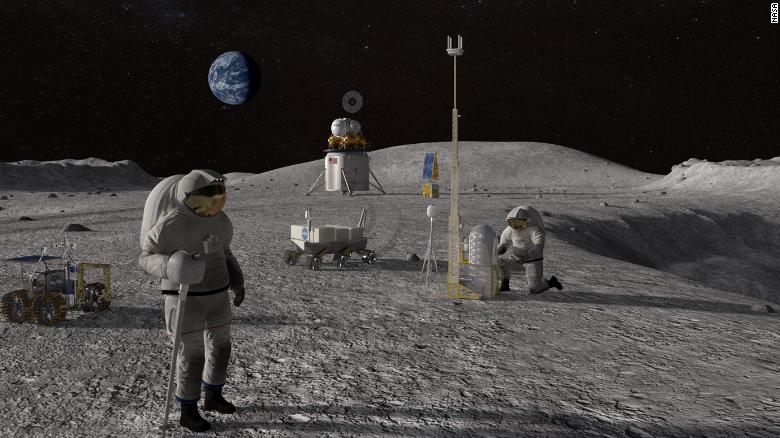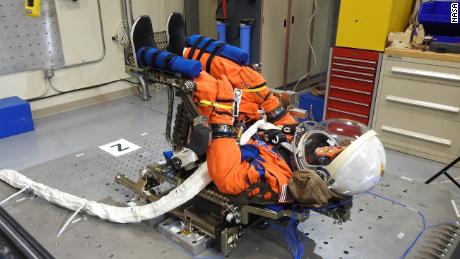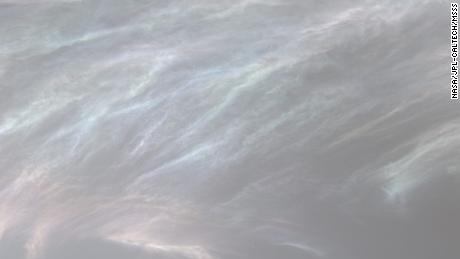(CNN)One mannequin is about to have a much more astronomical purpose than its peers.
When NASA's Orion spacecraft takes off for the uncrewed Artemis I moon mission currently slated to launch this November, its commander's seat won't be empty: A mannequin -- outfitted with two radiation sensors and a first-generation Orion Crew Survival System spacesuit -- will be riding along to provide data on what human crew members might experience during the Artemis II spaceflight in 2023.
While the mannequin has a goal, it doesn't yet have a name. That's why NASA is holding a "Name the Artemis Moonikin Challenge." Every other day from June 16 to June 28, the agency is asking social media users on Twitter, Facebook and Instagram to vote between names, bracket style, until one emerges as the winner.
Voters can choose among eight names, according to a news release:
- ACE: "Straightforward, practical. Stands for Artemis Crew Explorer."
- CAMPOS: "Resourceful, problem-solver. A dedication to Arturo Campos, a key player in bringing Apollo 13 home."
- DELOS: "Nostalgic, romantic. The island where Apollo and Artemis were born, according to Greek myth."
- DUHART: "Warm, welcoming. A dedication to Irene Duhart Long, (the first female and first minority) chief medical officer at Kennedy Space Center."
- MONTGOMERY: "Pioneer, innovative. A dedication to Julius Montgomery, first African American to work at the Cape Canaveral Space Facility as a technical professional."
- RIGEL: "Bright, inspirational. The giant superstar in the Orion constellation."
- SHACKLETON: "Secretive, abundant. A crater on the Moon's south pole and a reference to a famous Antarctic explorer."
- WARGO: "Enthusiastic, passionate. A dedication to Michael Wargo, the agency's first Chief Exploration Scientist."
"Inviting the public to participate in the naming contests and other challenges is important to bring people along for the journey and inspire the next generation of explorers," said Kathryn Hambleton, a NASA spokesperson, via email. "We look forward to the final name selected for the moonikin and encourage people to follow along as we work toward a long-lasting presence on and around the Moon and get ready for the first mission to Mars."
Why a mannequin is going to space
Engineers will compare Artemis I flight data with previous ground-based tests conducted with the same mannequin and human subjects, NASA has said, to prepare for Artemis II.
"It's critical for us to get data from the Artemis I manikin to ensure all of the newly designed systems, coupled with an energy dampening system that the seats are mounted on, integrate together and provide the protection crew members will need in preparation for our first crewed mission on Artemis II," said Jason Hutt, NASA's lead for Orion Crew Systems Integration, in a statement.
One emergency situation for which the mannequin has been tested is whether astronauts could safely escape their seats if they were stuck upside down in water after splashdown, Hutt said. "The manikin was subjected to a series of drops as engineers confidently figured out how crew could safely climb out of Orion after spending a couple of weeks in deep space."
The agency also uses Anthropometric Test Devices, or "crash test dummies," in evaluations that drop a demo Orion from an aircraft to ensure the Artemis II seat and suit can mitigate the risk of head and neck injury during ascent and landing, the most severe accelerations.
Also accompanying the "Moonikin" during Artemis I are Helga and Zohar, two female-bodied, model human torsos called "phantoms" that will sit in the two lower seats on Orion.
Helga and Zohar will be part of a study designed to quantify the space radiation astronauts may experience inside Orion during missions to the Moon, and to assess a radiation-shielding vest -- called AstroRad -- that may reduce exposure, according to NASA. The vest is currently being evaluated for fit and function while astronauts wear it on the International Space Station.
NASA has a history of crowdsourcing names for its space phantoms and devices.
The Mars rover Perseverance, which landed on the red planet February 19, got its name from a national contest won in early 2020 by Alexander Maher, a then-seventh grader in Virginia.
And Alabama-based teenager Vaneeza Rupani gets the credit for Ingenuity, the name of NASA's Mars helicopter. Rupani's essay submission in NASA's "Name the Rover" contest won out in 2020 among 28,000 entries.











